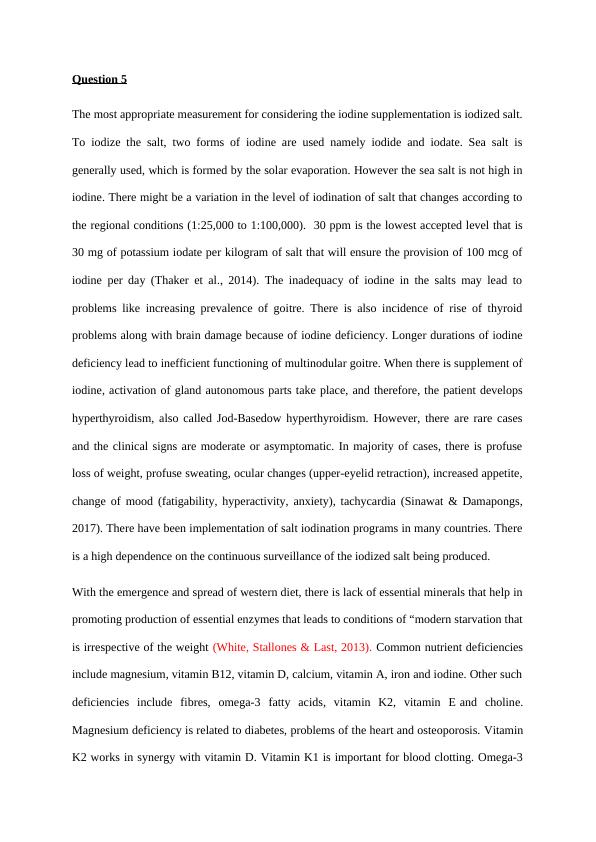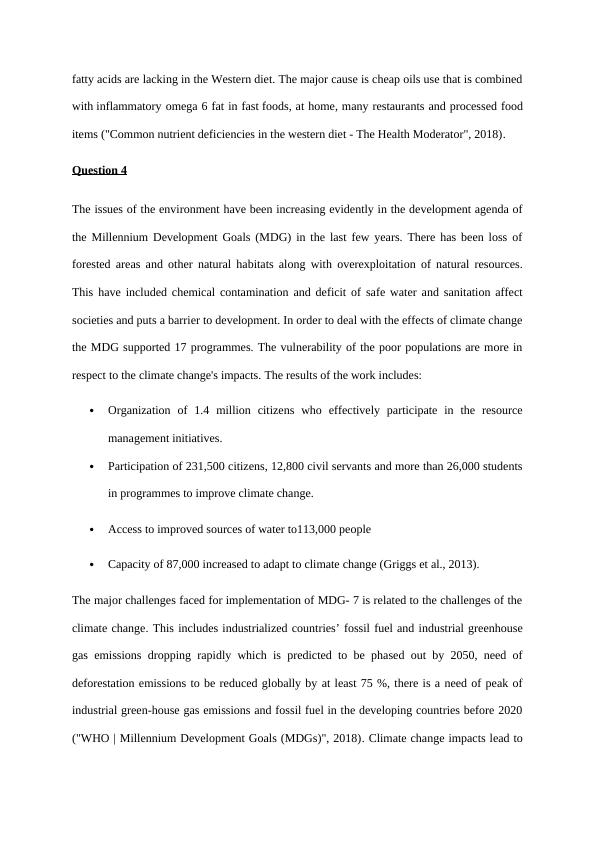Iodine Supplementation and Salt Iodination Programs
Added on 2023-06-11
4 Pages1120 Words413 Views
Question 5
The most appropriate measurement for considering the iodine supplementation is iodized salt.
To iodize the salt, two forms of iodine are used namely iodide and iodate. Sea salt is
generally used, which is formed by the solar evaporation. However the sea salt is not high in
iodine. There might be a variation in the level of iodination of salt that changes according to
the regional conditions (1:25,000 to 1:100,000). 30 ppm is the lowest accepted level that is
30 mg of potassium iodate per kilogram of salt that will ensure the provision of 100 mcg of
iodine per day (Thaker et al., 2014). The inadequacy of iodine in the salts may lead to
problems like increasing prevalence of goitre. There is also incidence of rise of thyroid
problems along with brain damage because of iodine deficiency. Longer durations of iodine
deficiency lead to inefficient functioning of multinodular goitre. When there is supplement of
iodine, activation of gland autonomous parts take place, and therefore, the patient develops
hyperthyroidism, also called Jod-Basedow hyperthyroidism. However, there are rare cases
and the clinical signs are moderate or asymptomatic. In majority of cases, there is profuse
loss of weight, profuse sweating, ocular changes (upper-eyelid retraction), increased appetite,
change of mood (fatigability, hyperactivity, anxiety), tachycardia (Sinawat & Damapongs,
2017). There have been implementation of salt iodination programs in many countries. There
is a high dependence on the continuous surveillance of the iodized salt being produced.
With the emergence and spread of western diet, there is lack of essential minerals that help in
promoting production of essential enzymes that leads to conditions of “modern starvation that
is irrespective of the weight (White, Stallones & Last, 2013). Common nutrient deficiencies
include magnesium, vitamin B12, vitamin D, calcium, vitamin A, iron and iodine. Other such
deficiencies include fibres, omega-3 fatty acids, vitamin K2, vitamin E and choline.
Magnesium deficiency is related to diabetes, problems of the heart and osteoporosis. Vitamin
K2 works in synergy with vitamin D. Vitamin K1 is important for blood clotting. Omega-3
The most appropriate measurement for considering the iodine supplementation is iodized salt.
To iodize the salt, two forms of iodine are used namely iodide and iodate. Sea salt is
generally used, which is formed by the solar evaporation. However the sea salt is not high in
iodine. There might be a variation in the level of iodination of salt that changes according to
the regional conditions (1:25,000 to 1:100,000). 30 ppm is the lowest accepted level that is
30 mg of potassium iodate per kilogram of salt that will ensure the provision of 100 mcg of
iodine per day (Thaker et al., 2014). The inadequacy of iodine in the salts may lead to
problems like increasing prevalence of goitre. There is also incidence of rise of thyroid
problems along with brain damage because of iodine deficiency. Longer durations of iodine
deficiency lead to inefficient functioning of multinodular goitre. When there is supplement of
iodine, activation of gland autonomous parts take place, and therefore, the patient develops
hyperthyroidism, also called Jod-Basedow hyperthyroidism. However, there are rare cases
and the clinical signs are moderate or asymptomatic. In majority of cases, there is profuse
loss of weight, profuse sweating, ocular changes (upper-eyelid retraction), increased appetite,
change of mood (fatigability, hyperactivity, anxiety), tachycardia (Sinawat & Damapongs,
2017). There have been implementation of salt iodination programs in many countries. There
is a high dependence on the continuous surveillance of the iodized salt being produced.
With the emergence and spread of western diet, there is lack of essential minerals that help in
promoting production of essential enzymes that leads to conditions of “modern starvation that
is irrespective of the weight (White, Stallones & Last, 2013). Common nutrient deficiencies
include magnesium, vitamin B12, vitamin D, calcium, vitamin A, iron and iodine. Other such
deficiencies include fibres, omega-3 fatty acids, vitamin K2, vitamin E and choline.
Magnesium deficiency is related to diabetes, problems of the heart and osteoporosis. Vitamin
K2 works in synergy with vitamin D. Vitamin K1 is important for blood clotting. Omega-3

fatty acids are lacking in the Western diet. The major cause is cheap oils use that is combined
with inflammatory omega 6 fat in fast foods, at home, many restaurants and processed food
items ("Common nutrient deficiencies in the western diet - The Health Moderator", 2018).
Question 4
The issues of the environment have been increasing evidently in the development agenda of
the Millennium Development Goals (MDG) in the last few years. There has been loss of
forested areas and other natural habitats along with overexploitation of natural resources.
This have included chemical contamination and deficit of safe water and sanitation affect
societies and puts a barrier to development. In order to deal with the effects of climate change
the MDG supported 17 programmes. The vulnerability of the poor populations are more in
respect to the climate change's impacts. The results of the work includes:
Organization of 1.4 million citizens who effectively participate in the resource
management initiatives.
Participation of 231,500 citizens, 12,800 civil servants and more than 26,000 students
in programmes to improve climate change.
Access to improved sources of water to113,000 people
Capacity of 87,000 increased to adapt to climate change (Griggs et al., 2013).
The major challenges faced for implementation of MDG- 7 is related to the challenges of the
climate change. This includes industrialized countries’ fossil fuel and industrial greenhouse
gas emissions dropping rapidly which is predicted to be phased out by 2050, need of
deforestation emissions to be reduced globally by at least 75 %, there is a need of peak of
industrial green-house gas emissions and fossil fuel in the developing countries before 2020
("WHO | Millennium Development Goals (MDGs)", 2018). Climate change impacts lead to
with inflammatory omega 6 fat in fast foods, at home, many restaurants and processed food
items ("Common nutrient deficiencies in the western diet - The Health Moderator", 2018).
Question 4
The issues of the environment have been increasing evidently in the development agenda of
the Millennium Development Goals (MDG) in the last few years. There has been loss of
forested areas and other natural habitats along with overexploitation of natural resources.
This have included chemical contamination and deficit of safe water and sanitation affect
societies and puts a barrier to development. In order to deal with the effects of climate change
the MDG supported 17 programmes. The vulnerability of the poor populations are more in
respect to the climate change's impacts. The results of the work includes:
Organization of 1.4 million citizens who effectively participate in the resource
management initiatives.
Participation of 231,500 citizens, 12,800 civil servants and more than 26,000 students
in programmes to improve climate change.
Access to improved sources of water to113,000 people
Capacity of 87,000 increased to adapt to climate change (Griggs et al., 2013).
The major challenges faced for implementation of MDG- 7 is related to the challenges of the
climate change. This includes industrialized countries’ fossil fuel and industrial greenhouse
gas emissions dropping rapidly which is predicted to be phased out by 2050, need of
deforestation emissions to be reduced globally by at least 75 %, there is a need of peak of
industrial green-house gas emissions and fossil fuel in the developing countries before 2020
("WHO | Millennium Development Goals (MDGs)", 2018). Climate change impacts lead to

End of preview
Want to access all the pages? Upload your documents or become a member.
